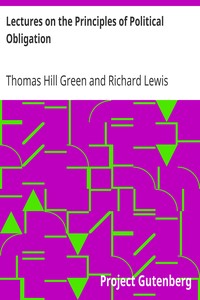Lectures on the Principles of Political Obligation by Thomas Hill Green
"Lectures on the Principles of Political Obligation" by Thomas Hill Green is a philosophical treatise written in the late 19th century. This scholarly work discusses the foundations of political obligation, examining ethical dimensions of citizenship, law, and freedom. Green engages with various philosophical traditions to explore how individuals relate to political institutions and the nature of moral rights and duties within society. The opening of this work sets the stage for an
inquiry into the concept of political obligation, suggesting its close ties to moral philosophy. Green begins by addressing the meaning of freedom, emphasizing that true freedom is determined not merely by the absence of external constraints but by the alignment of the will with the moral ideal. Through a critical examination of different philosophical traditions, including those of Plato, St. Paul, and Kant, he introduces the complexity of understanding freedom in relation to law and moral actions. This thoughtful discourse indicates that the lectures aim to clarify how personal and societal ethics converge in the framework of political theory. (This is an automatically generated summary.)
Read now or download (free!)
| Choose how to read this book | Url | Size | ||||
|---|---|---|---|---|---|---|
| Read online (web) | https://www.gutenberg.org/ebooks/61889.html.images | 683 kB | ||||
| EPUB3 (E-readers incl. Send-to-Kindle) | https://www.gutenberg.org/ebooks/61889.epub3.images | 313 kB | ||||
| EPUB (older E-readers) | https://www.gutenberg.org/ebooks/61889.epub.images | 323 kB | ||||
| EPUB (no images, older E-readers) | https://www.gutenberg.org/ebooks/61889.epub.noimages | 293 kB | ||||
| Kindle | https://www.gutenberg.org/ebooks/61889.kf8.images | 622 kB | ||||
| older Kindles | https://www.gutenberg.org/ebooks/61889.kindle.images | 595 kB | ||||
| Plain Text UTF-8 | https://www.gutenberg.org/ebooks/61889.txt.utf-8 | 658 kB | ||||
| Download HTML (zip) | https://www.gutenberg.org/cache/epub/61889/pg61889-h.zip | 310 kB | ||||
| There may be more files related to this item. | ||||||
About this eBook
| Author | Green, Thomas Hill, 1836-1882 |
|---|---|
| Author of introduction, etc. | Bosanquet, Bernard, 1848-1923 |
| Editor | Nettleship, Richard Lewis, 1846-1892 |
| Title |
Lectures on the Principles of Political Obligation Reprinted from Green's Philosophical Works, vol. II., with Preface by Bernard Bosanquet |
| Note | Reading ease score: 45.3 (College-level). Difficult to read. |
| Credits | GDurb |
| Language | English |
| LoC Class | JC: Political science: Political theory |
| Subject | Liberty |
| Subject | Natural law |
| Subject | Political obligation |
| Category | Text |
| EBook-No. | 61889 |
| Release Date | Apr 22, 2020 |
| Copyright Status | Public domain in the USA. |
| Downloads | 100 downloads in the last 30 days. |
| Project Gutenberg eBooks are always free! | |

